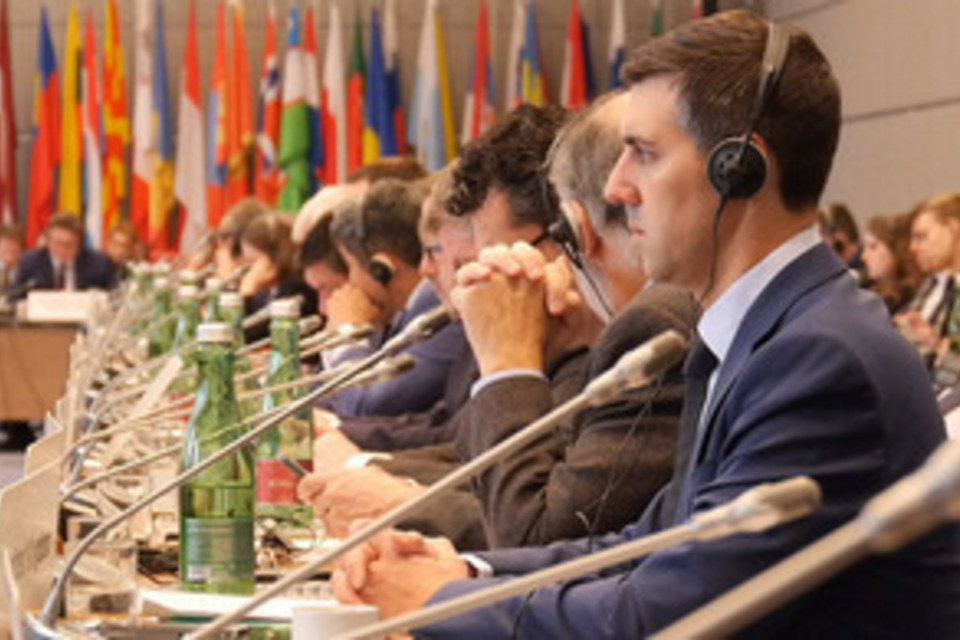Russia is trying to maximise civilian hardship over winter: UK statement to the OSCE
Ambassador Neil Bush condemns Russia's missile attacks targeting Ukraine's critical infrastructure, and the impact on human lives.

Thank you, Mr Chair. On 31 October, Russia launched a wave of missile attacks targeting hydroelectric dams and other critical infrastructure across Ukraine. Strikes were reported close to Kyiv, and in at least 10 other cities and regions. Around twenty energy facilities were hit, including hydroelectric plants in Zaprorizhzhia, Kremenchuk, and the Dniester dam close to the border with Moldova. Millions across Ukraine faced power outages and in some cities, including Kyiv, Dnipro and Zhytomyr, they lost water supply.
These have direct human costs. According to the head of the Kyiv regional hospital, all surgeries were cancelled, as surgeons could not sterilise their theatres or tools. Cities closer to the front-line, such as Nikopol, went for days without power. In Mykolaiv, where Russia cut off the city’s water supplies over six months ago, residents have had to queue at distribution points near the frontline, braving frequent shelling. I want to focus my statement this week on energy, the environment and food supply.
Mr Chair, as we have flagged in previous weeks, Russia is trying to maximise civilian hardship over winter. According to President Zelenskyy, Russia has already damaged or destroyed about 40% of Ukraine’s civil energy infrastructure. And we know that vulnerable groups suffer disproportionately – be it the elderly, those with medical conditions or disabilities. As President Putin will be aware, attacks which disproportionately kill civilians, and destroy objects indispensable to the survival of civilians, are prohibited under international humanitarian law. It is morally bankrupt.
Ukraine’s tireless efforts to repair infrastructure and restore services have once again demonstrated the resilience of the Ukrainian people. As Ukraine prepares for what will be a tough winter, the UK has donated 850 generators, guaranteed a £50m loan for Ukraine’s electricity grid operator, and will shortly disburse £10m to the Energy Community’s fund for energy equipment. We will not let Ukraine face this winter alone.
In addition to the lives lost, the environment is another victim of Russia’s ongoing invasion. Four months ago, the World Bank estimated that reconstruction and recovery would cost about USD 349 billion. Of this, the decontamination of land would cost over USD 70 billion, agriculture 19 billion and energy 10 billion. The numbers today would certainly be significantly higher. Russian attacks have degraded and polluted Ukrainian land and water, which will take decades to remedy. We deplore Russia’s persistent violent actions against nuclear facilities in Ukraine, including at the Zaporizhzia Nuclear Power Plant. This significantly raises the risk of a nuclear incident, endangering the population of Ukraine, neighbouring States and the international community. In addition, as we have mentioned previously, the IAEA have been invited by Ukraine in the name of transparency, and there is no evidence to back up Russia’s false allegations that Ukraine is preparing to use a “dirty bomb” - we once again call on Russia to desist from its nuclear rhetoric.
Mr Chair, the Black Sea Grain Initiative is vital to global food security, and a matter of life or death for 100 million people at risk of extreme poverty. An average of 100,000 tons of grain is exported each day under the Black Sea Grain initiative – enough to feed 5 million people for a month. We welcome an extension of this initiative. But Mr Chair – President Putin must stop weaponising food and hunger. He realised he shot himself in the foot by earlier stopping ships from entering Ukrainian ports to load up grain to feed the world. The Grain Initiative must now be extended beyond November without further Russian impediments.
Mr Chair, we will support Ukraine for as long as it takes to restore its territorial integrity, recover and rebuild. In the face of these challenges to its energy infrastructure, its environment and food supply stemming from Russia’s illegal invasion - Ukraine will win. Ukraine will rebuild. And Ukraine will flourish.